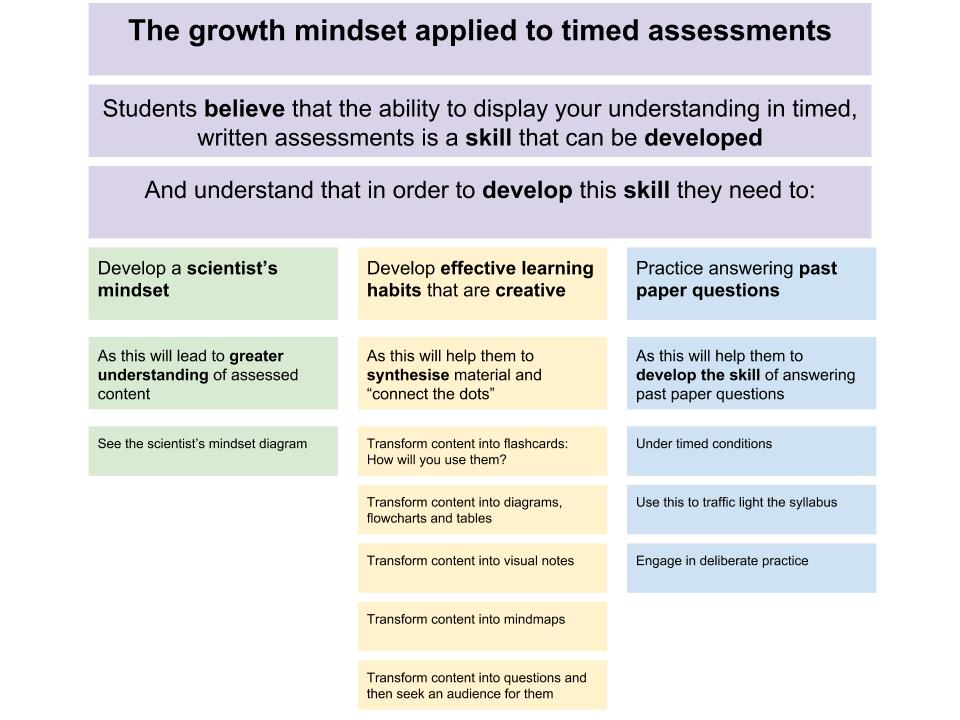So many students come into High School Science with an excitement for science. In Middle School, they have been tinkering, designing, experimenting and playing around with science (whilst still picking up some fundamental knowledge I hope!). Then, they sit their first timed assessment and get their first results. For some students, this sends them down a path of chasing the top grade and forgetting to develop a Scientist's Mindset (for a look at my blog post on this, go here). For some, it sends them into a spiral of despair that makes them say things like, "I'm no good at science!". And then there are plenty of students in the middle. Then, there are those students who do well in timed assessments but still keep that sense of wonder about the universe.
Something I try to stress to my students is that timed assessments do not define their ability in science. They are but one way of assessing knowledge and understanding. They do not say whether you are a good scientist or not. I have attempted to reframe students thinking by calling them a "Learning Opportunity". This always draws a laugh and a smile (but does it actually change their approach...?). When approaching timed assessments, I want students to be thinking the following:
This is all great, but I do understand that students find timed assessments stressful. They know that at the end of the course they will have to sit a timed assessment. This is the way education courses are set up at the moment. As a classroom teacher, I am not in a position to change that right now (I can only add to the discourse and hope that influential policymakers enact change), but I am in a position to change my students' approach and outlook on that. With that in mind, I have tried to adapt Carol Dweck's growth mindset (more on that here) to timed assessments. My thinking is outlined in the diagram below. Just like The Scientist's Mindset, it is a work in progress and I would love to hear your thoughts! Is this approach valid? What have you tried here? Is anything missing? Are you a student and scared of timed assessments? How might this approach help you see the light at the end of the tunnel and regain your love of learning?

Hi Louie,
Thanks for sharing. Whilst timed assessments aren’t my favorite measure of learning–they are authentic in ways that are easy to forget:
a) yes they are stressful, and real life is stressful: thinking about ways to cope with discomfort pushes us to develop skills we will need in every year of life
b) sometimes we genuinely are on a deadline–and we have to work with that: timed assessments teach us to focus, prioritize, and do what we can with what we have
c) the best approach to any exam is ‘slow burn learning,’ rather than cramming in the night before–a slow and steady measure perserverance prepares us most reasonably. Exams underline how pivotal that approach can be.
d) be self-aware enough to understand we don’t always control the conditions: in a very real way exams remind us that we don’t call all the shots–we will be asked to do things, we will need to respond and react to conditions which are outside of our control: and what we do when challenged; how we manage in ‘tough times,’ is an indicator of character—and is an opportunity to unpack our resilience
e) have perspective: failing, or doing poorly on a test does not ruin your life. Mistakes do not undo all the learning. One might even argue that we should be thankful for being in an educational system that stretches and challenges rather than one that bores and condescends.
Thanks for stretching my thinking with this post, Louie!
Hi Tricia,
Thanks so much for the comment! Wow, you’ve opened up my thinking here!
I think I am in complete agreement that timed assessments can have their use and I love how you have laid it out. When I have time, I see a little infographic or sketch note their to get up in my classroom! Generally, the points you make there are about using this thing that we have to do (timed assessments) and putting a different spin on it. Let’s use it to learn more about ourselves, what works for us.
Let’s work with point c) above. If we articulated the approach to slow burn learning and how timed assessments help develop that approach we could talk about the importance of slow burn learning. How is this applicable in your lives going forward. For example, the best projects are planned and involve chunking things rather than doing it all at the last minute (slow burn learning vs cram revision!).
Thanks again for stretching MY thinking here. It has already added to my approach in the classroom.
Louie